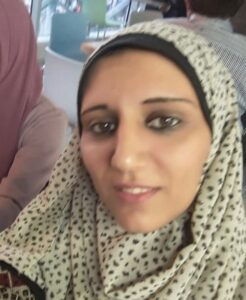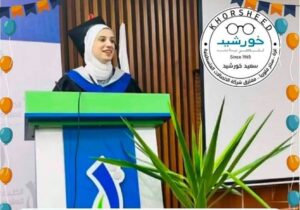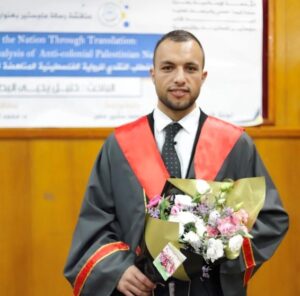Cet article du blog a été écrit par Ayman Qwaider (EENET’s Arabic/MENA Network Manager), le 7 novembre 2023.
Traduit par Siham Touil.
Les enfants pris pour cible
La moitié des plus de deux millions d’habitants de la bande de Gaza sont des enfants, et actuellement, l’un d’entre eux est tué toutes les 10 minutes. Depuis le 7 octobre 2023[1], les statistiques du Ministère de la Santé à Gaza montrent qu’au moins 4 100 enfants palestiniens ont été tués dans les bombardements incessants de l’armée israélienne. Plus de 1 000 autres enfants sont portés disparus, probablement enterrés sous des bâtiments détruits. Prendre pour cible des civils, en particulier des enfants, constitue une violation grave des Conventions de Genève et est considéré comme un crime de guerre. Les enfants ne devraient jamais être la cible d’un conflit, de part et d’autre. Les enfants de Gaza sont les plus touchés par l’agression israélienne en cours, qui les prive de leurs droits fondamentaux, notamment l’accès à la nourriture, à l’eau, à un abri, à l’éducation, aux soins de santé et à la sécurité.
Une enfance en cage
Aujourd’hui dans la bande de Gaza, aucun enfant n’a jamais connu la liberté. Depuis 2005, le territoire est soumis à de sévères restrictions imposées par Israël, et le blocus s’est renforcé lorsque le Hamas est arrivé au pouvoir en 2006. L’ONU considère Israël comme une « puissance occupante » au sein des territoires palestiniens et le blocus viole le droit international. L’enclave est l’une des zones les plus densément peuplées de la planète (5 850 habitants au kilomètre carré), souvent décrite comme la plus grande prison à ciel ouvert du monde. Depuis 16 ans, l’économie, les infrastructures, l’emploi, les communications, l’éducation et le système de santé suffoquent et les déplacements de la population sont presque entièrement limités. La plupart des enfants n’ont jamais bénéficié de 24 heures d’électricité en continu dans leur vie. Tandis que la catastrophe humanitaire actuelle, extrêmement meurtrière, attire l’attention du monde entier, l’ONU et les agences humanitaires parlent depuis de nombreuses années de la crise humanitaire croissante dans la bande de Gaza et mettent en garde contre les violations flagrantes des droits de l’Homme.
L’enseignement perturbé
Les Gazaouis sont des personnes dynamiques et instruites, rêvant d’un avenir meilleur. Les aspirations de plusieurs générations sont aujourd’hui plus que jamais attaquées. Plus de 625 000 étudiants et 22 564 enseignants de la bande de Gaza ont été touchés par les attaques contre l’enseignement ce mois passé. Les enfants n’ont pas accès à la scolarité et n’ont pas d’endroit sûr où se réfugier. Le Ministère de l’Éducation a annulé l’année scolaire, et 214 écoles ont jusqu’à présent été endommagées par les bombardements, parmi lesquelles 45 sont entièrement hors service. Des enseignants ont été tués dans les bombardements.
Alaa Qwaider, une mère aimante, a été tuée dans sa propre maison, détruite lors d’une frappe aérienne israélienne. Cette attaque dévastatrice a également coûté la vie à ses trois jeunes enfants : Eman, tragiquement tuée le jour de son cinquième anniversaire, Faiz, quatre ans et la petite Sarah, âgée de sept mois seulement. Quatorze autres membres de sa famille ont été tués dans la même frappe aérienne, ne laissant en vie que le mari d’Alaa.

Alaa n’était pas seulement une mère. C’était aussi une professeure de mathématiques très respectée dans son lycée à Gaza City. Elle était très fière de sa carrière et de sa mission importante consistant à enseigner auprès des jeunes. Elle partageait souvent avec moi (Ayman Qwaider, auteur de l’article, est son frère) des photos de ses réalisations. Son dévouement à l’enseignement était évident dans ses interactions avec ses étudiants qui la tenaient en haute estime pour son implication dans leur scolarité. Alaa connaissait le contexte de vie de ses élèves – vivre sous blocus pendant 16 ans au sein d’un régime d’apartheid[2] et être témoin d’opérations militaires régulières – et l’impact sur leur apprentissage et leurs besoins émotionnels. Elle recherchait activement des opportunités de formation et de développement de ses compétences pour mieux soutenir ses étudiants, en particulier ceux qui avaient été exposés à un traumatisme.
Le Ministère de l’Enseignement supérieur rapporte que 437 de ses étudiants et 12 membres du personnel universitaire ont été tués au cours des trois premières semaines de cette guerre, dont 85 % à Gaza City. On craint que de nombreux autres étudiants soient ensevelis sous les décombres. La scolarité de près de 90 000 étudiants de l’enseignement supérieur est perturbée, les universités ayant été contraintes de suspendre toutes leurs activités. Une université de Gaza a dû annuler son année universitaire 2023-24 en raison de la perte de tous ses étudiants dans les bombardements israéliens.
Un cinéma pour les enfants de Gaza et une pédagogie adaptée aux traumatismes
Jusqu’au 7 octobre, le projet Gaza Children’s Cinema (GCC) a fonctionné dans les bibliothèques locales à travers la bande de Gaza, en partenariat avec l’Institut Tamer pour l’éducation communautaire. Le GCC avait concentré ses activités sur les communautés marginalisées et frontalières (avec Israël), s’adressant aux enfants les plus isolés. Malheureusement, ces communautés frontalières sont particulièrement vulnérables face aux destructions des forces israéliennes, notamment lors d’incursions terrestres. Les rapports indiquent que dans toute la bande de Gaza, plus de 200 000 logements ont été soit détruits, soit endommagés, et des dizaines d’installations publiques et de services – telles que celles utilisées par le CCG – ont subi des dommages importants. Le GCC a été justement créé pour offrir des alternatives éducatives et des activités récréatives aux enfants profondément touchés par un traumatisme. Cela leur a fourni un répit temporaire face à la réalité difficile à laquelle ils étaient confrontés. Avant cette nouvelle guerre à Gaza, près d’un enfant sur trois recevait déjà un soutien psychologique. Les bombardements dévastateurs actuels, d’une ampleur sans précédent, ont exposé les enfants de Gaza à des traumatismes encore plus graves et plus durables, avec des conséquences qui persisteront probablement tout au long de leur vie. Mais les programmes vitaux destinés à les soutenir, comme le GCC, ont été anéantis et leur reconstruction pourrait prendre de nombreuses années.
L’UNICEF a déclaré qu’au cours des dernières semaines, « Gaza est devenue un cimetière pour des milliers d’enfants ». Il est impossible de comprendre l’impact de cette situation sur les enfants qui survivent. Les programmes éducatifs pour faire face aux traumatismes devront être un point essentiel de la scolarité dans un avenir prochain. Cela signifie approfondir la formation des enseignants, des éducateurs afin de les doter des compétences nécessaires pour soutenir efficacement leurs élèves. Mais les enseignants et les éducateurs, eux-mêmes traumatisés, auront besoin de beaucoup plus de soutien émotionnel et professionnel pour apporter l’accompagnement nécessaire aux élèves également traumatisés. Cependant, rien de tout cela ne pourra se produire tant qu’il n’y aura pas un cessez-le-feu complet entre les forces israéliennes et le Hamas.
Protéger les droits des enfants
La communauté internationale prend note de cette guerre. Adele Khodr, directrice régionale de l’UNICEF pour le Moyen-Orient et l’Afrique du Nord, la qualifie de « tâche croissante sur notre conscience collective ». L’UNICEF, aux côtés de centaines d’ONG, a également appelé à un cessez-le-feu immédiat pour protéger les enfants de Gaza. Il est crucial que la communauté internationale prenne des mesures immédiates pour protéger leurs droits et leur bien-être : fournir une aide humanitaire et œuvrer en faveur d’un cessez-le-feu durable. Le monde doit s’unir pour garantir que la sécurité, les soins de santé et l’éducation ne soient pas un luxe mais des droits fondamentaux pour tous.
Les étudiants et les enseignants tués à Gaza
Plusieurs milliers d’enfants innocents, leurs familles et leurs enseignants ont été tués à Gaza, non seulement ces dernières semaines, mais au cours des 75 dernières années.
Osama Abu Safia[3] était étudiant en médecine à l’Université Al Azhar de Gaza. Il avait récemment réussi l’examen de la première étape du USMLE[4] et était un bénévole actif, faisant la promotion de l’éducation sanitaire dans les mosquées et les écoles. Son potentiel pour devenir un médecin talentueux dans le futur et ses contributions à sa communauté ont été tragiquement stoppés par une frappe aérienne israélienne sur Gaza.

Yasmine Khorshid[5] a été diplômée en gestion des bibliothèques il y a à peine trois mois. Elle a été tuée avec sa famille, ses tantes, ses oncles et leurs enfants dans la ville de Gaza. Plus de 30 personnes de la famille Khorshid ont été tués.

Khalil Abu Yahiya[6] a été tué avec toute sa famille à Gaza. Khalil était maître de conférences à l’Université Islamique de Gaza et était largement reconnu pour son génie en tant qu’écrivain, activiste et penseur.

[1] Le 7 October 2023, le Hamas a tué 1400 Israéliens et a pris en otages plus de 200 personnes, incluant des enfants
[2] See: https://www.hrw.org/report/2021/04/27/threshold-crossed/israeli-authorities-and-crimes-apartheid-and-persecution and https://www.amnesty.org/en/latest/campaigns/2022/02/israels-system-of-apartheid/
[3] https://twitter.com/osaidessermd/status/1719118526168899961?s=46&t=PTHQCFBhd570mEv_M8fiQw
[4] Le United States Medical Licensing Examination est un programme d’examen organisé en trois étapes dont l’objectif est d’obtenir un permis médical aux États-Unis
[5] https://twitter.com/uzisall/status/1719699570010046958?s=46&t=PTHQCFBhd570mEv_M8fiQw
[6] https://twitter.com/fatimazsaid/status/1719165606375641174?s=46&t=PTHQCFBhd570mEv_M8fiQw




